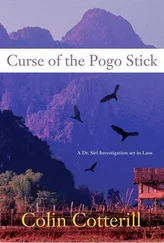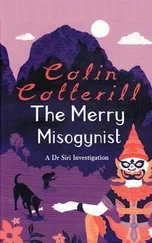Colin Cotterill - Love Songs from a Shallow Grave
Здесь есть возможность читать онлайн «Colin Cotterill - Love Songs from a Shallow Grave» весь текст электронной книги совершенно бесплатно (целиком полную версию без сокращений). В некоторых случаях можно слушать аудио, скачать через торрент в формате fb2 и присутствует краткое содержание. Жанр: Криминальный детектив, на английском языке. Описание произведения, (предисловие) а так же отзывы посетителей доступны на портале библиотеки ЛибКат.
- Название:Love Songs from a Shallow Grave
- Автор:
- Жанр:
- Год:неизвестен
- ISBN:нет данных
- Рейтинг книги:3 / 5. Голосов: 1
-
Избранное:Добавить в избранное
- Отзывы:
-
Ваша оценка:
- 60
- 1
- 2
- 3
- 4
- 5
Love Songs from a Shallow Grave: краткое содержание, описание и аннотация
Предлагаем к чтению аннотацию, описание, краткое содержание или предисловие (зависит от того, что написал сам автор книги «Love Songs from a Shallow Grave»). Если вы не нашли необходимую информацию о книге — напишите в комментариях, мы постараемся отыскать её.
Love Songs from a Shallow Grave — читать онлайн бесплатно полную книгу (весь текст) целиком
Ниже представлен текст книги, разбитый по страницам. Система сохранения места последней прочитанной страницы, позволяет с удобством читать онлайн бесплатно книгу «Love Songs from a Shallow Grave», без необходимости каждый раз заново искать на чём Вы остановились. Поставьте закладку, и сможете в любой момент перейти на страницу, на которой закончили чтение.
Интервал:
Закладка:
Certainly, a lot of it was merely the tying up of loose ends. As a good policeman he would have done that anyway…if they hadn't been so understaffed. Just him and Sihot and so many reports to write. And what was the point? They had their man, didn't they?
It was the post script to the note that had most riled the inspector. Just who did this little doctor think he was? Not satisfied with playing detective and telling him how to do his job, he had to interfere in Phosy's personal matters, too. Phosy, I'm sorry. I meant to tell you this earlier this evening but I was distracted by the visit to Neung. It would have been better face to face but I've lost my chance. It's quite simple. If you aren't having an affair, tell your wife, immediately. If you are, stop it.
Phosy scratched out the entire postscript with his black biro, slashed at it till the paper tore. Still not satisfied, he took a pair of scissors from his pencil drawer and snipped off the bottom of the page. He scrunched it up and threw it into the wastepaper bin.
"Interfering little bastard. None of your business," he thought. "Who are you to tell me what I should or shouldn't do? You aren't even a relative, certainly not my father. Too late now, Siri. Where were you forty years ago when I needed you?"?
There weren't any orphans in Laos, not government-sponsored or otherwise. And that was due to the fact that folks didn't give children enough time to think they were unloved. If you lost your parents, a relative would step in and fill their sandals as quickly as blood clotting on a wound, barely a scab. If you had the misfortune of losing your whole family, a neighbour would take you in, or someone in the next village. A local headman, perhaps. But, either way, you'd wake up next day with a new family and nobody would harp on your loss. They'd tell you what happened without drama and, no matter how poor, they wouldn't complain about what a burden you were. At least, that's the way it had been in Laos. That's the way it had been for Phosy.
He'd been studying at his primary school one day in the little northern village of Ban Maknow, Lemon Town. His mother and father just happened to be working in the wrong field at the wrong time and were mowed down in crossfire between this or that faction. Someone had come by the school and whispered in the teacher's ear. As Phosy had no uncles or aunts, he went home that evening with his friend, Pow. Pow's mother and father already had three other children living with them who had lost their parents in a civil war nobody really understood. It was such a clinical transition that it was several days before Phosy fully realised that he'd never see his parents again. He'd cried, of course. He missed them. But he was already safe and happy before loneliness had a chance to take hold.
His new father was a carpenter. He carved temple doors and fine furniture and all seven of the children, five boys and two girls, learned to use woodworking tools at an early age. There was no secondary schooling in those parts so Phosy had hoped his new father would take him on as an apprentice as he had done with his eldest son. But when Phosy was ten, a young man had come to the village. He was educated and well-spoken. In the open-sided village meeting hut, he explained to all the parents how he had been plucked from a place very much like this when he was a boy. How he'd been given the opportunity to study in the liberated zones in the north-east. He'd graduated from high school there and gone on to further education in Vietnam. He told them that they'd recently opened a new school and that they could take eight hundred new students. All food and board would be taken care of.
A week later, Phosy, Pow, and their sister, Beybey, were in a covered truck heading across the country. Phosy felt something in his stomach that he would later come to recognise as betrayal. They'd given him away. The family he'd loved had handed him over to a stranger. He couldn't understand it but life was travelling too quickly to analyse. They taught him things in the liberated zones. He learned how the French colonists had stolen their land. He learned how the rich landowners had taken advantage of the common people. He learned how to be angry and to punch his fist into the air and shout, "Liberation!" He learned how to shoot guns and kill. And, by the time he reached seventeen, he and his false siblings were junior officers in the new Lao People's Liberation Army. All three of them were so entangled in the revolution they hadn't found time to go back to visit the family that had raised and cared for them…and given them away.
Phosy rose fastest through the ranks. He had an inquisitive mind and, once he reached the position of colonel, he was transferred to military intelligence and trained in the art of espionage just outside Hanoi. With a new identity, he arrived in Vientiane in 1965 and began work as a carpenter. Other LPLA men and women had been trickled into the mainstream of royalist society, spreading their beliefs subtly from the inside, passing on intelligence, preparing for the day revolution would come. They became known as the mosquitoes inside the net, these sleeper agents, ready to sting when the time was right.
But, while he was waiting, something occurred that Phosy hadn't prepared for. He fell in love. There was probably a whole chapter in the Indochinese Communist Party spy handbook detailing the dangers of falling in love whilst engaged in subversive activities. But Phosy was emotionally lost and in need of confirmation that someone might want him. He married and they produced first a boy, then a girl, and that old feeling of family returned to him. That warm comforting glow of belonging took over Phosy's life. At times it seemed more important than nationhood. The revolution took a back seat to Phosy's family.
But the revolution came anyway. It came swiftly on the heels of the Vietminh victory in Saigon and without the wholesale bloodshed that had been envisaged. And the Pathet Lao moles in their burrows in Vientiane celebrated quietly. The status quo had changed but there were still enemies. The new socialist government couldn't decide what to do with its spies. Under the guise of re-education, Phosy and his colleagues were recalled to the north-east and new roles were allocated. He was away for three months and when he returned to the capital, his wife and children were gone. Gone, the neighbours said, to a refugee camp on the Thai side. They'd paid a fisherman for a night passage to Nong Kai. Gone because his wife was afraid of the communists. Afraid of what they might do to her. Gone because Phosy hadn't been able to tell her he was the enemy.
Phosy left Vientiane and rejoined his unit in the northeast. Three families had deserted him. Phosy was a serial orphan. Love crumbled in his hands like hearts moulded from fine sand. Why invest? Why waste all that emotion? He'd met nurse Dtui. He'd liked her. He'd made her pregnant. He'd offered to marry her. She'd asked him if he could love her and he'd told her no, but he was prepared to marry her anyway. That had been good enough for Dtui and for him, companionship without fear of heartbreak. Then Malee had come along, the sweetest button of a babe. She had smiled and he'd remembered all the other smiles that had trapped him. He watched them together, Dtui and her baby, and he'd seen treachery in their eyes. He watched how she controlled the mind of the little girl. How would they break him, these two? Every day he was afraid he'd come home and find them gone. And the conflict was killing him, splitting him apart. On one side was the feeling that there was nothing on the earth so full of wonder as the love of a family. And on the other was the certainty that they would desert him. Either in death or in deceit they would go away and leave him without hope. How dare he tell them he loved them??
Читать дальшеИнтервал:
Закладка:
Похожие книги на «Love Songs from a Shallow Grave»
Представляем Вашему вниманию похожие книги на «Love Songs from a Shallow Grave» списком для выбора. Мы отобрали схожую по названию и смыслу литературу в надежде предоставить читателям больше вариантов отыскать новые, интересные, ещё непрочитанные произведения.
Обсуждение, отзывы о книге «Love Songs from a Shallow Grave» и просто собственные мнения читателей. Оставьте ваши комментарии, напишите, что Вы думаете о произведении, его смысле или главных героях. Укажите что конкретно понравилось, а что нет, и почему Вы так считаете.












